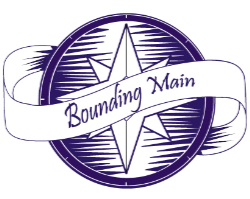Lyrics
Little Boy Billy
Fo’c’sle Song, Forebitter
Traditional
There were three men of Bristol City,
There were three men of Bristol City,
They stole a ship and went to sea,
They stole a ship and went to sea.
There was Gorging Jack and Guzzling Jimmy,
And also Little Boy Billee
They stole a tin of captain’s biscuits,
And one large bottle of whiskey.
But when they reached the broad Atlantic,
They had nothing left but one split pea.
Said Gorging Jack to Guzzling Jimmy,
“We’ve naught to eat – let’s eat Billee.”
“O Little Boy Billee, we’re going to kill and eat yur.
“So undo the top button of your little chemie (1).”
“O may I say my catechism,
“That my dear mother taught to me?”
But when he reached the Eleventh Commandment,
He cried “Yo Ho for land I see!”
“I see Jerusalem and Madagascar,
“And North and South Amerikee”
“I see the British fleet at anchor,
“And our Lord Nelson, K.C.B. (2).”
They hung Gorging Jack and Guzzling Jimmy,
But they made an admiral of Little Boy Billee.
Song Notes
Rob Roberts sings this on Sea Songs & Shanties (Saydisc CD-SDL 405), taken from an earlier Folktracks release from recordings curated by Peter Kennedy between 1950-1960. In the liner notes Kennedy relates, “I think the words were probably translated and adapted by the poet William Thackeray from a French folk song, possibly from Le Petit Navire (The Little Corvettes), ‘C’etat un pe-petit navire – qui ja-jamais navigue – ah oui – ah oui.’ Bob and I both learned the tune from Henry Trefusis of Trefusis, Falmouth in Cornwall.”
Bounding Main picked up this song from the CD mentioned above. It is not often performed on the maritime music circuit that we have seen, but it was well liked among our Bounding Mainiacs fans.
1 chemise
a loose shirt-like undergarment. Also called: shift
[ETYMOLOGY: 14th Century: from Old French: shirt, from Late Latin camisa, perhaps of Celtic origin]
(Gorging Jack wanted it unbuttoned to more neatly slit Little Boy Billy’s throat.)
2 KCB
abbrev. for Knight Commander of the Bath (a Brit. title)
Originally created by Henry IV in 1399 as the senior order of knighthood, and revived by George I in 1725 with one division (military) and class, as the most important order of chivalry conferred on commoners. Enlarged 1815 to include military and civil divisions with three classes (GCB only in civil). Further enlarged 1847 to allow all classes in civil division. Wikipedia has a comprehensive article on the subject.

